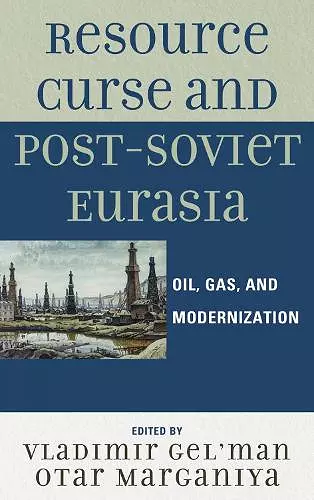Resource Curse and Post-Soviet Eurasia
Oil, Gas, and Modernization
Vladimir Gel'man author Otar Marganiya author
Format:Hardback
Publisher:Lexington Books
Published:6th Aug '10
Currently unavailable, and unfortunately no date known when it will be back
This hardback is available in another edition too:
- Paperback£42.00(9780739143742)

By the end of the 2000s, the term "resource curse" had become so widespread that it had turned into a kind of magic keyword, not only in the scholarly language of the social sciences, but also in the discourse of politicians, commentators and analysts all over the world-—like the term "modernization" in the early 1960s or "transition" in the early 1990s. In fact, the aggravation of many problems in the global economy and politics, against the background of the rally of oil prices in 2004–2008, became the environment for academic and public debates about the role of natural resources in general, and oil and gas in particular, in the development of various societies. The results of numerous studies do not give a clear answer to questions about the nature and mechanisms of the influence of the oil and gas abundance on the economic, political and social processes in various states and nations. However, the majority of scholars and observers agree that this influence in the most of countries is primarily negative. Resource Curse and Post-Soviet Eurasia: Oil, Gas, and Modernization is an in-depth analysis of the impact of oil and gas abundance on political, economic, and social developments of Russia and other post-Soviet states and nations (such as Kazakhstan and Azerbaijan). The chapters of the book systematically examine various effects of "resource curse" in different arenas such as state building, regime changes, rule of law, property rights, policy-making, interest representation, and international relations in theoretical, historical, and comparative perspectives. The authors analyze the role of oil and gas dependency in the evolution and subsequent collapse of the Soviet Union, authoritarian drift of post-Soviet countries, building of predatory state and pendulum-like swings of Russia from "state capture" of 1990s to "business capture" of 2000s, uneasy relationships between the state and special interest groups, and numerous problems of "geo-economics" of pipelines in post-Soviet Eurasia.
This collection of writings about the 'Resource Curse' by scholars from Russia who are familiar with Western and Russian literature provides valuable perspectives on the discussion about Eurasia in Eurasia. The 'multicolored and multifaceted patchwork' promised in the introduction is a plan more than overfulfilled. -- Harley D. Balzer, Georgetown University
This is an elegantly written and eminently researched volume on Russia's key dilemma: the oil curse. These modern Russian scholars sensibly suggest that Russia's energy curse is severe but not insurmountable. This is the best book on oil and Russia to date and an enjoyable read. -- Anders Åslund, author of Russia's Capitalist Revolution
Several major themes explored in this well-written, well-researched volume on the causes, mechanisms, and consequences of Eurasia's resource curse relate to the relationship among resource dependency, economic development, and the institutional environment....A worthwhile read. The introduction is exceptional in putting the subject matter into perspective....Summing Up: Highly recommended. * CHOICE *
This book is relevant both for those interested in the development of the energy-rich countries of post - Soviet Eurasia and for those interested in the debate about the existence and effects of the resource curse. Its multidisciplinary approach is sensible. Its gloomy view of future prospects echoes that of a wide stratum of the present-day Russian intelligentsia. The contributors are familiar with both the English and Russian literatures on the subjects they discuss. Their conclusions are thought-provoking. Let us hope that they are also action-provoking. * Slavic Review *
In the words of Gel’man, the book offers ‘a kind of multicolored and multifaceted patchwork, which is not only designed to sew interdisciplinary scholarly pluralism into a coherent picture, but also stimulate cross-fertilization aimed to supplement the research contribution of each of the chapters’ (p. 11). Overall, the book appeals by continuing the analysis of the resource–regime interconnection in a worldwide comparative perspective and aims to make a contribution not only to area studies but also to ‘intensive discussions on the causes, mechanisms, and consequences of the resource curse in general’ (p. 18). It seems to fulfill this task. * Europe-Asia Studies *
ISBN: 9780739143735
Dimensions: 240mm x 162mm x 21mm
Weight: 513g
226 pages